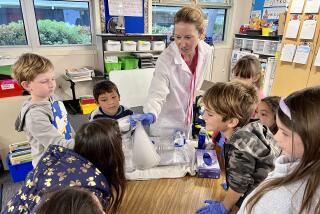Standards Panel Rescinds Choice of Science Team
- Share via
SACRAMENTO — The state is back to ground zero in its efforts to write standards for what California students should know in science at every grade.
Faced with sharp criticism over having spurned a team of scientists that included three Nobel Prize-winning chemists--who offered to work for free--the state standards commission on Monday decided to start over.
In doing so, the body also voted to rescind its decision to give the contract, for $178,000, to a group of scientists and educators based at Cal State San Bernardino that lacked the marquee names of the team that included the Nobel laureates.
Commission Executive Director Scott Hill said Monday that, under the commission’s rules, the offer to work for free should have given the Nobel winners’ group--Associated Scientists--more of an advantage. But some of the members of the evaluation team were skeptical of that offer and had taken away points for it.
Hill also said that neither of the two competing proposals actually scored high enough to win the contract under the commission’s rules. The San Bernardino proposal, which was submitted under the auspices of the Institute for Science Education, received 82 points out of a possible 115. But the commission had specified a minimum of 93 points to get the job.
The Associated Scientists, which was spearheaded by a Cal State Northridge biologist, scored only 43 points. When it did not get the contract, that group protested the commission’s decision, which led the panel to reexamine the process.
“This commission is dedicated to maintaining the integrity of its work, and if we’ve made a mistake we want to correct it,” Hill said.
Beyond the technical problems with the process, the commission’s decision highlighted two competing views of science education.
Members of the Institute for Science Education said their intent is to recommend standards that make it possible for far more students to take more sciences--and to maintain the intellectual rigor of the material that is taught. The Associated Scientists, on the other hand, complained that too many science educators today are bent on leaving out essential elements of disciplines such as biology and chemistry in an effort to appeal to a broader audience.
Hill acknowledged the accomplishments of Nobel Prize-winners Glenn T. Seaborg, Dudley R. Herschbach and Henry Taube but said their team “did not submit a rigorous, worthy proposal in the eyes of the evaluation team . . . whether anyone likes it or not.”
The state has already adopted standards for reading and language arts and is completing math standards.
More to Read
Sign up for Essential California
The most important California stories and recommendations in your inbox every morning.
You may occasionally receive promotional content from the Los Angeles Times.










